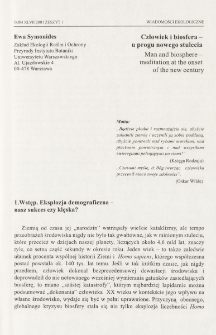- Search in all Repository
- Literature and maps
- Archeology
- Mills database
- Natural sciences
Advanced search
Advanced search
Advanced search
Advanced search
Advanced search

Object
Title: Człowiek i biosfera - u progu nowego stulecia
Subtitle:
Człowiek i biosfera ; Man and biosphere - mediation at the onset of the new century
Contributor:
Polska Akademia Nauk. Instytut Ekologii
Publisher:
Oficyna Wydawnicza Instytut Ekologii PAN
Place of publishing:
Description:
Pages 3-31 ; 24 cm ; Bibliographical references (pages 26-30) ; Abstract in English
Type of object:
Abstract:
Life on the Earth, sińce its onset about 3.75 billions years ago, was freąuently disturbed by great cataclysms, but the ratę of environmental changes was never as violent as in the past century and never before such changes were caused by a species living on the Earth. The devastation of natural environment and the modern extinction of many plant and animal species had no precedent in the earlier history of the Earth and it is indubitably caused by humans - the most intelligent mammal species. The common history of Earth and humans counts only about 150 thousands years, and sińce then humans devastated the wildlife and naturę wherever they settled. However, the global environmental crisis took place only recently, in XX century, as the result of demographic explosion of human population.Among the most spectacular humans-caused transformations of natural environment the major are: global deforestation, the overall expansion of the deserts, soil degradation, species extinction or drastic decline of many populations of wild plants, animals, fungi and microorganisms. Human activity on the Earth drove the natural, both terrestrial and aąuatic, ecosystems into almost total extinction. The ozone layer is seriously damaged and global warming of the earth climate became the reality. Both phenomena may herald the sixth great extinction in the history of life on the Earth.The perspective of the global catastrophe urged the governments of nearly all countries to undertake the international cooperation to stop the further degradation and to improve the State of the environment. Last years of the past century brought about many conventions and international agreements aimed to regulate the access to the natural resources and to control their exploitation. The states-signatories are obliged to undertake all possible means to preserve the natural resources for present and futurę needs. First outcomes of this awakening were already visible at the end of the century - in many countries, the emission of green house gases was considerably reduced, the input of pollutants to freshwaters, sees and oceans was lowered, the forests surface increased, the habitats of many endangered species were restituted. These actions, though they do not entirely prevent the further environmentai deterioration. at least slow it considerably down. To save the life on our planet, the profound change of our attitude towards environment is needed - from anthropocentric doctrine considering ourselves as the supreme beings to the creed that representing only one of many species inhabiting the planet, we constitute merely the part of biosphere.
Relation:
Volume:
Issue:
Start page:
End page:
Detailed Resource Type:
Resource Identifier:
oai:rcin.org.pl:220820 ; 0013-2969
Source:
MiIZ PAN, call no. P.3259 ; click here to follow the link
Language:
Language of abstract:
Rights:
Creative Commons Attribution BY 3.0 PL license
Terms of use:
Copyright-protected material. [CC BY 3.0 PL] May be used within the scope specified in Creative Commons Attribution BY 3.0 PL license, full text available at: ; -
Digitizing institution:
Museum and Institute of Zoology of the Polish Academy of Sciences
Original in:
Library of the Museum and Institute of Zoology of the Polish Academy of Sciences
Projects co-financed by:
Access:
Object collections:
- Digital Repository of Scientific Institutes > Partners' collections > Museum and Institute of Zoology PAS > Scientific Journals
- Digital Repository of Scientific Institutes > Literature > Journals/Articles
Last modified:
Feb 4, 2025
In our library since:
Oct 26, 2021
Number of object content downloads / hits:
315
All available object's versions:
https://rcin.org.pl./publication/173194
Show description in RDF format:
Show description in RDFa format:
Show description in OAI-PMH format:
| Edition name | Date |
|---|---|
| Z. 1. Człowiek i biosfera - u progu nowego stulecia / Symonides E. | Feb 4, 2025 |
Objects Similar
Uchmański, Janusz
Sawicki, Ludwik (1893–1972)
Kufel, Lech
Jarzyna, Anita
Bujalska, Gabriela
Prokop, Paweł
Błażejczyk, Krzysztof Błażejczyk, Anna

 INSTYTUT ARCHEOLOGII I ETNOLOGII POLSKIEJ AKADEMII NAUK
INSTYTUT ARCHEOLOGII I ETNOLOGII POLSKIEJ AKADEMII NAUK
 INSTYTUT BADAŃ LITERACKICH POLSKIEJ AKADEMII NAUK
INSTYTUT BADAŃ LITERACKICH POLSKIEJ AKADEMII NAUK
 INSTYTUT BADAWCZY LEŚNICTWA
INSTYTUT BADAWCZY LEŚNICTWA
 INSTYTUT BIOLOGII DOŚWIADCZALNEJ IM. MARCELEGO NENCKIEGO POLSKIEJ AKADEMII NAUK
INSTYTUT BIOLOGII DOŚWIADCZALNEJ IM. MARCELEGO NENCKIEGO POLSKIEJ AKADEMII NAUK
 INSTYTUT BIOLOGII SSAKÓW POLSKIEJ AKADEMII NAUK
INSTYTUT BIOLOGII SSAKÓW POLSKIEJ AKADEMII NAUK
 INSTYTUT CHEMII FIZYCZNEJ PAN
INSTYTUT CHEMII FIZYCZNEJ PAN
 INSTYTUT CHEMII ORGANICZNEJ PAN
INSTYTUT CHEMII ORGANICZNEJ PAN
 INSTYTUT FILOZOFII I SOCJOLOGII PAN
INSTYTUT FILOZOFII I SOCJOLOGII PAN
 INSTYTUT GEOGRAFII I PRZESTRZENNEGO ZAGOSPODAROWANIA PAN
INSTYTUT GEOGRAFII I PRZESTRZENNEGO ZAGOSPODAROWANIA PAN
 INSTYTUT HISTORII im. TADEUSZA MANTEUFFLA POLSKIEJ AKADEMII NAUK
INSTYTUT HISTORII im. TADEUSZA MANTEUFFLA POLSKIEJ AKADEMII NAUK
 INSTYTUT JĘZYKA POLSKIEGO POLSKIEJ AKADEMII NAUK
INSTYTUT JĘZYKA POLSKIEGO POLSKIEJ AKADEMII NAUK
 INSTYTUT MATEMATYCZNY PAN
INSTYTUT MATEMATYCZNY PAN
 INSTYTUT MEDYCYNY DOŚWIADCZALNEJ I KLINICZNEJ IM.MIROSŁAWA MOSSAKOWSKIEGO POLSKIEJ AKADEMII NAUK
INSTYTUT MEDYCYNY DOŚWIADCZALNEJ I KLINICZNEJ IM.MIROSŁAWA MOSSAKOWSKIEGO POLSKIEJ AKADEMII NAUK
 INSTYTUT PODSTAWOWYCH PROBLEMÓW TECHNIKI PAN
INSTYTUT PODSTAWOWYCH PROBLEMÓW TECHNIKI PAN
 INSTYTUT SLAWISTYKI PAN
INSTYTUT SLAWISTYKI PAN
 SIEĆ BADAWCZA ŁUKASIEWICZ - INSTYTUT TECHNOLOGII MATERIAŁÓW ELEKTRONICZNYCH
SIEĆ BADAWCZA ŁUKASIEWICZ - INSTYTUT TECHNOLOGII MATERIAŁÓW ELEKTRONICZNYCH
 MUZEUM I INSTYTUT ZOOLOGII POLSKIEJ AKADEMII NAUK
MUZEUM I INSTYTUT ZOOLOGII POLSKIEJ AKADEMII NAUK
 INSTYTUT BADAŃ SYSTEMOWYCH PAN
INSTYTUT BADAŃ SYSTEMOWYCH PAN
 INSTYTUT BOTANIKI IM. WŁADYSŁAWA SZAFERA POLSKIEJ AKADEMII NAUK
INSTYTUT BOTANIKI IM. WŁADYSŁAWA SZAFERA POLSKIEJ AKADEMII NAUK


































